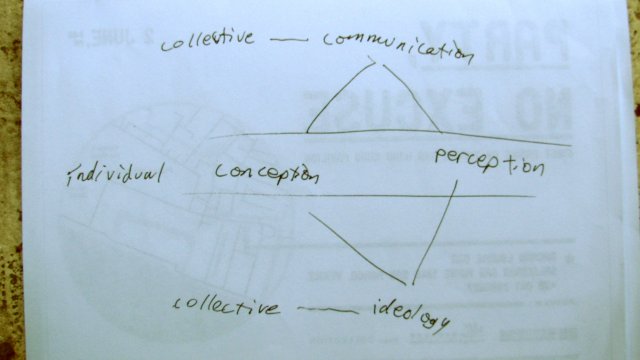It is evening and Xu Tan pops his head into my room. I am on my bed, producing a watercolor. He says, excuse me, gentleman, can I ask you something? Yes, sure, what is it boss, I answer.
I wanted to ask about the word ‘efficiency’.
Well, that’s an awfully big word.
Xu Tan sits down. Does it have something to do with reason?
I suppose reason can lead to efficiency, but there is a related concept, rationality, to rationalize, that is more relevant I guess.
Xu Tan nods. Remember that Keywords School participant from Israel, the performance artist, she protested that keywords are too efficient. To her that was a problem.
Yes, I remember, I was glad she challenged the format we had been using. I see her point, but I always thought that keywords had a double potential: one to cut short discussion, to dumb down an interaction to assumed understanding; and the other to invite elaboration, if one took the time to be aware of the way the keywords were used.
Xu Tan nods again, his hands look as though they are practicing new gestures. He says, keywords are approximations; the keywords way is through approximate understandings; we almost understand. Actually I don’t think keywords are true or correct. We had an Italian who explained to us his interest in the project, which he noticed was also inscribed into the physical “structure” of the school, was that words form an endless chain sequence “sign signifying a sign signifying a sign…” (in Italian, the more effective “significante significante significante…”).
I think about this tunnel to infinity and my brain hits an obstacle: But somehow the discussions were still about things. Maybe not truths, but things anyway.
Suddenly I remember the day we finished installation and Xu Tan, looking at the school structure and the perky white-board sign I had just written on that announced courses, wondered aloud if it looked like a missionary camp in the jungles of Vietnam.
We were talking about politics, and society, and translation, I point out, as I feel a shadow of doubt creep over me as to whether those were really signs, or things as I had just claimed.
Yes, we had some good discussions, he agrees.
I realize that despite the similar routine I had heard new things each day, and was rarely bored. One American participant, I continue, had given us the keyword “sparse”, because of its aesthetic meaning for her. She said that it’s important because it represents a certain type of English word that is short and dense but has a very specific meaning; as a keyword that is completely inefficient I think.
Yes, we heard many interesting things that will be good for my research, he says.
People often asked what the research was for; I suppose that was more the visitors, as opposed to the participants, who kind of understood directly through the practice of talking (although who knows, and some even snuck away). For some of these visitors, I can imagine the image of information they saw, the title of ‘School’, and maybe its location near the café, independent in the Giardini, confused many people who didn’t recognize these forms as ‘art’; on the other hand, if they identified it as an educational device (some were delighted we seemed to be offering Chinese language courses in the Biennale, as if a wry comment on language dominance), or a quasi-NGO, maybe they didn’t see it as efficient.
Xu Tan smiles, yes all of these people who called me teacher, but actually they were teaching me. The title “Keywords School” is also approximate, as there are really no students or teachers in that sense of school. I would tell people it is more like a workshop.
Yes, but I also think the word workshop is a bit misleading too, because it makes you think that you are there to learn a skill, and if I think about it as an art piece, as a participatory art piece, that requirement of getting something out of it becomes less important. It is like maintaining a certain frame of mind for a certain amount of time, so to me there was something performative about it.
Xu Tan holds up a finger, yes, but in a workshop you can also produce something, which is what we were doing.
That’s true, and there is a difference between this production and for example just sending out emails asking for keywords. This difference is so important for the project, maybe some visitors who saw it as just a database of keywords didn’t realize this.
But that’s okay. Because to me as long as the research is interesting it’s good. And some days we had just a couple of participants but the discussions went so deep. That is very important.
That was what was interesting about the Venice Biennale as a context for producing this project. You would have expected that we would come out with a kind of keywords Esperanto with limitless participants from all different parts of the world, and indeed the sign up sheet looked like a rainbow, but the context in reality is somewhat different. Many people’s plans changed. I think this is in fact such a big part of the project that has to be considered for next time. An institution needs specific kinds of connections with an appropriate public for this piece – I am not sure if you would consider this an actual aspect of the piece, how it fits or doesn’t fit with institutions…
Xu Tan pauses, then says, no, I don’t think this is a necessary part of the piece.
Then we eat dinner and enjoy it because He Cong is cooking.
(originally posted on the Vitamin Creative Space blog, 29/06/2009)
